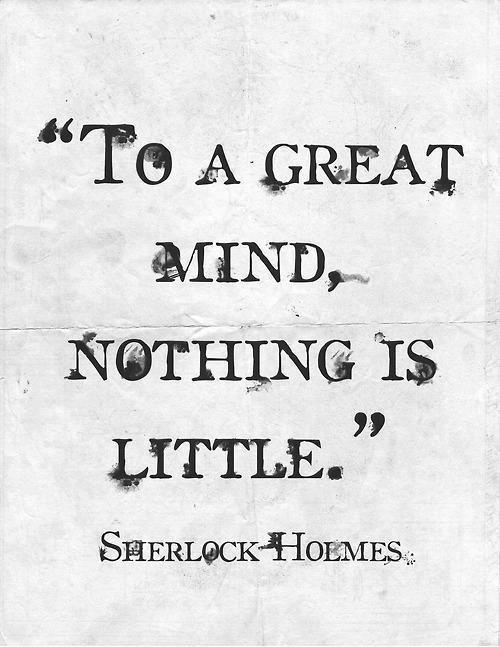
This gallery contains 1 photo.
miraclematerial: The walls of Baker St Station #london #underground #sherlockholmes

This gallery contains 1 photo.
miraclematerial: The walls of Baker St Station #london #underground #sherlockholmes

“This answer has been a long time coming; I apologize for making you wait so long, Emi-kun. I’ve given it a lot of thought and I must answer that my favorite passage is from the end of my favorite story, The Boscombe Valley Mystery:
“Well, it is not for me to judge you,” said Holmes as the old man signed the statement which had been drawn out. “I pray that we may never be exposed to such a temptation.”
“I pray not, sir. And what do you intend to do?”
“In view of your health, nothing. You are yourself aware that you will soon have to answer for your deed at a higher court than the Assizes. I will keep your confession, and if McCarthy is condemned I shall be forced to use it. If not, it shall never be seen by mortal eye; and your secret, whether you be alive or dead, shall be safe with us.”
“Farewell, then,” said the old man solemnly. “Your own deathbeds, when they come, will be the easier for the thought of the peace which you have given to mine.” Tottering and shaking in all his giant frame, he stumbled slowly from the room.
“God help us!” said Holmes after a long silence. “Why does fate play such tricks with poor, helpless worms? I never hear of such a case as this that I do not think of Baxter’s words, and say, ‘There, but for the grace of God, goes Sherlock Holmes.’”
"This was an instance in which Holmes refrained from following strict procedure in lieu of protecting someone (or in this case, someones). The law and its officers, I know, do all that they can to make things fair and just, but the law is not perfect. Judges, juries, lawyers, and so on are not perfect. No one is infallible. Because of this, there is a margin for error which is at times, unfortunately, enormous.
"Part of our duty as a detective is to not only examine the facts, but also the intention and motivation of the criminals and others involved to determine the true nature of the crime. Someone stealing a loaf of bread because their family is starving and they had no other choice is, of course, entirely different than someone who steals a loaf of bread in order to hurt the reputation of a business owner or commit tax fraud… both of which I have seen in the field in my years as a detective.
"Some have said that emotion really plays no part when discovering the truth, and in part, that is the case… You do have to lay aside biases and heart to get to the core of corruption, BUT, that said, your actions afterward must take that human element into account. After all, we detectives do plenty of things that are in a grey area as far as the law is concerned to get to that truth, but we allow ourselves certain leniency based on the premise that we are doing it for the greater good.
"We’re not the only ones who take the law into our own hands, so to speak; there are many who are in positions of power to do as they see fit, and we must trust that every person is doing what they truly believe is right, just, and correct in the sight of the Law and God for the benefit of man. Sadly, that is not always the case. Adding to this sadness is the desperation that it, at times, propagates; adding to the irrational passion that oft creates further criminal activity.
"Ahem, I’m about to go onto a tangent and into Utopia if I’m not careful, here. The point that I was trying to make is that, sometimes, we detectives (and other officers of the law) do not disclose all details according to procedure and protocol if it is in the best interests of those involved (innocent parties, typically), and at times alter the truth to further seal that protection. To be honest, I have done this on more than one occasion, but only with very careful, deliberate thought… and only after gathering hard evidence and materials necessary to correct the decision should it, in the end, have been made in error.
"Such as in this case, where Holmes asked the guilty party to pen and sign a confession and testimony, to be kept under lock and key in case it was needed. Why did he not turn the old man in? The culprit was already on his death bed and doing so would have destroyed two families in terms of reputation and emotional stability. The man confessed, evidence was gathered, and all arrangements made… but inevitably, was not punished for his crimes… at least as far as the courts would have preferred.
"This principle is key to how I operate within my means. No, I’m not perfect, nor do I claim to be, but I want to help people with the truth, not make them fearful of it.”

“As for portrayal of Holmes… there have been many, many wonderful actors over the years, and I am fond of many. Too many to really choose a "best,” as they each play up different aspects of his character. For this, however, I will give an honorable mention to actor Ben Syder in the 2010 The Asylum film, Sir Arthur Conan Doyle’s Sherlock Holmes. Much like Holmes, Syder pulls off the role as a sort of diamond-in-the-rough, shining and brilliant despite the rest of the film’s… ah… oddities.
“Regardless, I enjoyed it, mostly because of the Holmes and Watson that they chose, but it was certainly different! Who would have thought – dinosaurs and Sherlock Holmes?”


“I’ll clear the air right here and now: I do not typically wear the deerstalker cap and Inverness cape as seen in the photograph above.
"The costume (as it is) was originally intended for a single-time exclusive interview. My agent at the time pushed for the look in order to raise publicity for my work. Sensationalism, really. As it was London, we were met with (mostly) great success. Those who didn’t care for British cliches rolled their eyes and continued to ignore me, while others absolutely lapped it up.
"The headline and photos were very attractive, but the article itself did little to really outline the parallels between myself and Holmes… not that I am actually in any measure as fine a detective as he was reported (in fiction, of course) to be. But as an obvious tie-in, it made for a very nice little addition to their magazine.
"My agent further perpetuated that it would be appropriate to use the same look for other venues and, so, it became a sort of a signature outfit, though even then I only wore it to events of a public nature. Most of my detective and police work is conducted in standard business suit and tie. Nevertheless, the photographs used in the newspapers were usually from that same photo shoot instead of from actual crime scenes.
"Although that agent and I have parted ways and I’m now represented by someone else (with a much happier working relationship, I might add), I do still have the costume. It was well-received for my sendoff from London, but I’m not certain how much good it did for my reputation when it came to my debut in Japan… Unfortunately, I think it came off as more arrogant and otaku than intended.
"Regardless, I only wear it when requested by clients which, again, is typically only for public events and functions. Some seem to think that it’s a charming uniform. I don’t mind so much either way. I know that it isn’t accurate – it wasn’t ever specifically mentioned in Doyle’s writings, but rather in the illustrations starting with my favorite story, The Boscombe Valley Mystery, and caught on from there. Subsequently many stage plays, films, and parodies use this look to identify Holmes (despite its unofficial nature) and so on ever since.
"It’s not meant as disrespect of any kind, nor as an endorsement for an inaccurate portrayal. It’s an iconic symbol and publicity gimmick, meant for entertainment, and nothing more."

This gallery contains 1 photo.

“I know that you’re not the biggest fan of Sherlock Holmes, but I think you might find the answer by reading my favorite of Sir Arthur Conan Doyle’s works – the The Boscombe Valley Mystery.
“If you have further questions after reading, assuming you’ll oblige, I would be happy to discuss it with you, mon cher baron. Or, if you prefer, the essay that I’m writing on that very same story will be published relatively soon on the subject.”